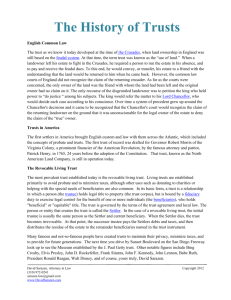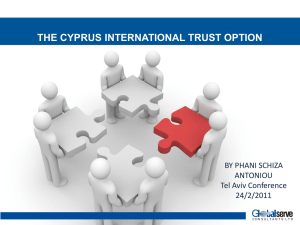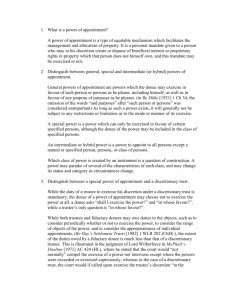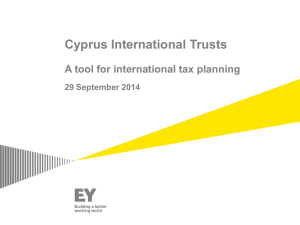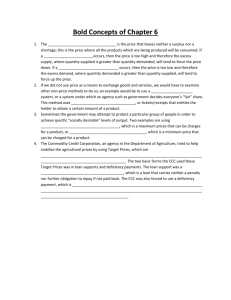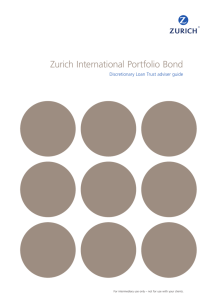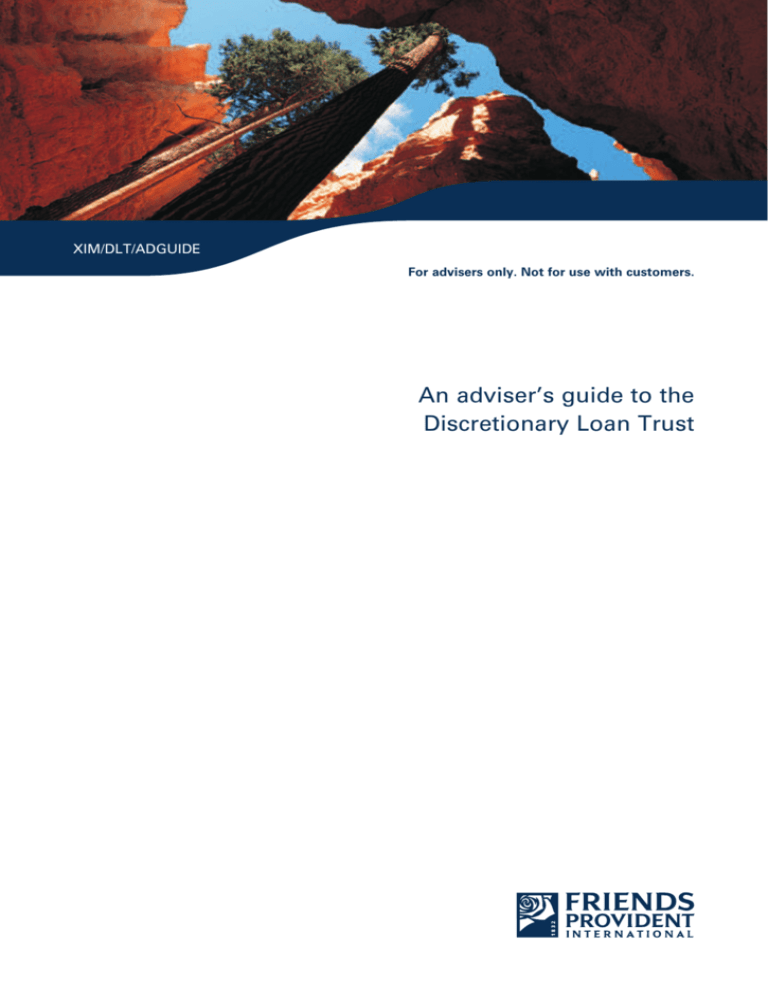
XIM/DLT/ADGUIDE
For advisers only. Not for use with customers.
An adviser’s guide to the
Discretionary Loan Trust
Contents
Background3
What is the Discretionary Loan Trust?
4
Who is the Trust suitable for?
4
How the Trust works
5
The benefits of the Discretionary Loan Trust
5
Questions & Answers
6
Why use Friends Provident International Limited?
9
In summary
9
Making life easier for you
9
What to do next
9
Cautionary notes
10
Important Notes
This Guide gives basic information about the Friends Provident International Limited
(Friends Provident International) Discretionary Loan Trust.
Friends Provident International cannot give legal advice in connection with trust
arrangements. This document has been drawn up with professional assistance for
guidance to our customers and their advisers. Friends Provident International does
not accept any legal responsibility for the efficacy or tax consequences of the Trust
wordings and whether the Trust will be treated as a settlement for inheritance tax
purposes.
The following tax treatment applies to any settlement created (after 2006) by a UK
domiciled Settlor or that involves a settlement of UK assets:
• an immediate ‘entry’ tax charge of 20% on lifetime transfers that exceed the IHT
Nil Rate Band (NRB);
• a ‘periodic’ tax charge of a maximum of 6% on the value of trust assets over the
IHT NRB once every ten years; and
• an ‘exit’ charge proportionate to the periodic charge when funds are taken out of
a trust between ten-year anniversaries.
These rules apply to settlements created on and after 22nd March 2006, additions
of new assets to existing trusts and, subject to transitional provisions, to other
IHT‑relevant events in relation to existing trusts.
The Trust and statements are based on Friends Provident International’s current
understanding of UK inheritance tax law and HM Revenue & Customs practice as at
January 2013. Before proceeding with this Trust we strongly recommend the Trust is
referred to your client’s own legal advisers to ensure it meets their needs. The Trust is
therefore provided on the clear understanding that it is a draft for the consideration of
your client’s legal advisers.
Throughout this Guide, the term ‘spouse’ also includes a civil partner for UK-domiciled
individuals under the UK Civil Partnership Act 2004.
2
The Discretionary Loan Trust
Background
There is little doubt that many individuals underestimate the size of their taxable estate.
When you take into account the value of the private residence, contents and personal
effects, investments, life assurance policies, bank and building society deposits, cars
and second homes, an individual can quickly have an estate worth more than the
inheritance tax (IHT) nil rate band which is currently GBP325,000 for tax year 2012-13.
On death, assets that exceed this figure passing to a person other than the deceased’s
UK-domiciled spouse will be subject to inheritance tax at 40%.
Just consider how much of an estate would be taken by HM Revenue & Customs
(HMRC) if a person should die leaving assets to anyone other than his/her spouse,
a situation that will inevitably arise on the death of the survivor of a married couple
(see Figure 1).
Figure 1: IHT – the effect on what you leave behind (based on 2012-13 figures
and only one nil rate band available)
IHT GBP70,000
IHT GBP170,000
IHT GBP270,000
Gross Estate GBP500,000
Gross Estate GBP750,000
Gross Estate GBP1,000,000
What can be done to mitigate this problem?
One effective way of IHT planning is to gift assets direct to individuals. Normally, if the
Settlor survives by seven years, the gift will be outside of the estate for IHT purposes.
However, not everybody can afford to gift assets away, although they may wish to
carry out some IHT planning.
The solution
It is in order to satisfy the needs of these people that Friends Provident International
has introduced the Discretionary Loan Trust – a lump sum inheritance tax plan which
is designed to provide long-term benefits whilst giving the Settlor the right to receive a
stream of tax-efficient cash payments.
The purpose of the Trust is therefore to enable your clients, as the investor, to make
a lump sum investment which will:
• provide capital to them as and when they require
• protect any growth in the investment from UK inheritance tax.
3
What is the Discretionary Loan Trust?
The Trust is a discretionary trust, i.e. one where the Trustees have full discretion on
who will benefit and when.
The creation of a loan trust is not a gift for IHT purposes so is not a chargeable lifetime
transfer. However, the 10-year periodic charge could apply if the investment growth is
in excess of the then Nil Rate Band.
Who is the Trust suitable for?
The Friends Provident International Discretionary Loan Trust is suitable for investors
looking for the following:
• To reduce their IHT liability
• To receive regular or one-off repayments of the loan
• All investment growth to be outside the estate
• To provide capital for a wide range of potential Beneficiaries on the death of the
Lender, potentially free of IHT
• A wide range of investment funds that offer greater potential for capital growth
over the medium to long term
• The flexibility to release the outstanding loan to Beneficiaries if not required.
4
How the Trust works
Getting started
There are two versions of the discretionary loan trust available, a single settlor and
joint settlor deed.
Your client (the Settlor) creates a Discretionary Loan Trust, appointing trustees.
The Settlor then makes a loan to the trustees of his chosen investment amount.
If using the joint settlor version, two individual loans are made to the trustees.
The trustees invest this capital into a Friends Provident International investment
product. The Trust Deed and an application form for the policy are available on
request or from our website www.fpinternational.com.
The loan and repayments
The Settlor can choose to have the loan repaid in regular instalments or by one-off
payments. Either way, any capital growth on the policy accumulates outside the
Settlor’s estate. The loan amount not repaid will form part of the Settlor’s estate.
The value of an investment is not guaranteed and all trustees assume responsibility
for repayment of the loan. For joint cases, trustees must keep accurate records,
keeping the two loans separate.
Tax-efficiency of policies held in a Discretionary Loan Trust
The settlor is able to request loan repayments of up to 5% of the premium amount
from the trustees, without an immediate charge to income tax. Each withdrawal is
a part-repayment of the loan. If withdrawals of 5% per year are chosen, this would
mean the loan would be repaid after 20 years. If more than 5% per year is withdrawn,
the excess will be subject to income tax and may reduce any age-related personal
allowances or tax credits if the Settlor is resident in the UK.
• Investment switches within a Friends Provident International Investment product
create no liability to Capital Gains Tax, either for the Settlor or the trustees.
• Life policies are deemed to be ‘non-income producing’ assets and therefore
considerably reduce the administrative duties of the trustees.
• The combination of these tax benefits make our Investment products the ideal
investment choice for a Discretionary Loan Trust.
The benefits of the Discretionary Loan Trust
The Trust provides your clients with the following:
• A means of freezing their IHT liability
• Access to their original capital during their lifetime through regular or one-off loan
repayments
• Protection of any capital growth so that it can pass to their beneficiaries following
their death
• A wide class of discretionary beneficiaries who may finally benefit from the
investment
• A wide range of investment funds to choose from.
5
Questions & Answers
The following address many typical questions you may have in relation to the Discretionary Loan Trust. The Settlor is the person
who creates the Trust.
Who is the Discretionary Loan
Trust suitable for?
What are the main benefits of
the Discretionary Loan Trust?
The Trust is suitable for individuals on whose death a potential IHT liability will arise
and who wish to ensure that some IHT mitigation is achieved whilst also retaining
access to the invested capital.
It enables the Settlor to:
retain access to the original invested capital through loan repayments
provide long-term benefits in any investment growth to the Settlor’s chosen
Beneficiaries
• ensure all growth from the investment is outside of the estate.
•
•
How is the Trust set up?
The Settlor sets up the Trust and the Trustees apply for a Friends Provident
International investment product. The Settlor can, if he wishes, pay the premium for
the policy direct to Friends Provident International.
Can an existing policy be
assigned to the Trust?
No. The Discretionary Loan Trust is only suitable for new policy applications.
Who is the Settlor?
The person who is lending the money to the Trustees for investment.
Can spouses set up their
own Trust?
It is possible as long as the Beneficiary of each Trust is not the other partner.
Can spouses set up the
Trust jointly?
Yes, the joint settlor deed can be used for joint cases.
Can spouses set up a Trust for
the benefit of each other?
This is not recommended as HMRC could regard it as an ‘Associated Operation’ and
treat both arrangements as one. This could be treated as a gift with reservation and
subject to inheritance tax.
When and whom should the
Settlor appoint as Trustees?
The Settlor must name the other Trustees when he executes the Trust document.
The appointed persons must be aged 18 or over, of sound mind and not bankrupt, and
must have the confidence of the Lender – these are normally trusted family members
or a corporate trustee. It is essential that at least two Trustees are appointed, and a
maximum of four.
What is the role of the Trustees?
The Trustees are responsible for administering the Trust fund in accordance with the
terms of the Trust. The Settlor is automatically a Trustee.
Can Beneficiaries be appointed
Trustees?
Yes, as long as they are aged 18 or over, of sound mind and not bankrupt. However,
care should be exercised in advance, as the Beneficiary would then have a say in how
the Trust is administered.
Can new Trustees be appointed?
The Settlor has the power to appoint and retire Trustees, provided at least two remain.
Any additional Trustee(s) (up to maximum of four) will assume joint responsibility.
Who should be the Beneficiaries?
The Trust contains a wide class of discretionary Beneficiaries from which the Trustees
can choose.
6
Can Beneficiaries be changed?
The Trust is a discretionary trust, which means the Trustees have full discretion on
who they appoint as Beneficiaries.
On whose lives is the policy
written?
We recommend the policy is written on the lives of potential Beneficiaries. This has
the advantage of enabling the policy to remain in force for as long as possible and
thus helps provide both income tax and inheritance tax efficiency. Subject to the limit
explained in What is the maximum number of lives assured permitted under the
policy? below, clearly the greater the number of potential Beneficiaries who are lives
assured the greater the flexibility. Neither the Settlor nor the Settlor’s spouse can be
a nominated Beneficiary.
What is the maximum number
of lives assured permitted under
the policy?
Friends Provident International will permit up to ten lives assured on a last‑survivor
basis which will enable a number of potential Beneficiaries to be included.
Are further investments
permitted?
Yes. Please refer to our Technical Services Department for further information.
What are the inheritance tax
benefits of the Trust?
The Settlor is able to make a loan to the Trust and receive loan repayments when
required. Any investment growth is outside of the Settlor’s estate.
How does the Trust provide the
Settlor with an income?
Income is provided via loan repayments to the Settlor by means of withdrawals from
the policy. These can be on a regular or an one-off basis when the Settlor so wishes.
How are the loan repayments
paid to the Settlor?
Payments in satisfaction of the Settlor’s loan entitlement are made from the policy by
Friends Provident International direct to the Settlor. The Trustees should keep records
of all such payments.
What if the Settlor no longer
requires loan repayments?
The Settlor can release his entitlement. This is likely to be treated as a chargeable
transfer, to the extent they are not covered by the annual exemption of GBP3,000.
Why is the loan interest-free?
To allow capital growth on the policy to accumulate outside the Lender’s estate and
for the benefit of the Beneficiaries.
Can the Beneficiaries benefit
whilst the Settlor is still alive?
The Trustees have a liability to the Settlor for any outstanding loan repayments and
must therefore take this into account.
What if the policy loses value so
the Settlor cannot be paid his
entitlement?
The Settlor’s entitlement is subject to the Trust fund being sufficient to meet that
entitlement. The Trustees have no personal liability to the Settlor in cases where the
investment reduces in value.
Is the Settlor immediately taxed
on the loan repayments?
No. Any withdrawals taken are deemed a return of capital by HMRC which means that
if 5% per annum is paid to the Lender this can be done for 20 years before there is
any immediate tax liability.
Who is taxed?
It is our understanding that if a chargeable event occurs the tax will fall on the Settlor
if UK-resident, or if the chargeable event occurs in the same tax year as the death of
the Settlor. If the Settlor is non-UK resident or has died in a previous tax year, then
the tax will fall on the Trustees if any of the Trustees are UK-resident. If none of the
Trustees is UK-resident, the tax will fall on any UK-resident Beneficiaries.
Is the Trust caught by Pre-owned
Assets Tax?
No, it is not thought so as HMRC have confirmed in writing to the Association of
British Insurers that Pre-owned Assets Tax will not apply to loan trusts. Friends
Provident International has also taken legal advice to confirm this.
7
Can the arrangement be
wound up?
The Trust is irrevocable and so cannot simply be wound-up by the Settlor, as he only
has the right to recover any outstanding loan amounts.
Can the policy be surrendered
while the Settlor is still alive?
It can be, subject to chargeable event legislation. However, the Trustees still have
a liability to the Settlor for any unpaid loan amounts.
What are the IHT implications
on the death of the Settlor?
Any loan repayments not made will form part of the Settlor’s estate for IHT purposes.
The Beneficiaries will become entitled to the remainder of the Trust fund absolutely.
Please note it is important that the Trustees keep accurate records of any loan
repayments made to the Settlor. These can be in the form of a receipt sent by the
Settlor to the Trustees every time he receives a repayment, which the Trustees retain.
A draft receipt is included in the trust documentation pack. For single settlor cases this
is form E and for joint settlor cases, form D.
8
Why use Friends Provident International?
An investment policy is a straightforward and attractive option. Based in the Isle of Man,
Friends Provident International investment policies offer:
• the prospect of long-term capital growth,
• a comprehensive range of professionally-managed funds, both internally and
externally-managed, offering a diverse mix of asset type, geographic location and
management style, catering for all attitudes of investment risk,
• valuable tax benefits of gross roll up, tax-free switches and tax-deferred loan
repayments to the Lender via the annual 5% per annum withdrawal allowance,
• the political stability of assets held in the Isle of Man.
In summary
• The Discretionary Loan Trust allows your clients to reduce the impact of
inheritance tax immediately and in the long term.
• Access to regular withdrawals via loan repayments.
• All capital growth is immediately outside the estate.
• On death, capital goes to the appointed Beneficiaries.
• The valuable tax benefits of a policy from an international life assurance company.
Making life easier for you and your clients
In addition to the Discretionary Loan Trust, Friends Provident International has a
range of trusts to suit other circumstances. With our wide range of products and trust
documentation, we can help you develop a realistic strategy for your clients, as well as
being flexible enough for any future changes in circumstances.
What to do next
Our Discretionary Loan Trust Documentation Pack contains all the documentation
necessary to put the scheme into operation.
9
Cautionary notes
The information given in this document is based on Friends Provident International’s
understanding of UK and Isle of Man tax law and HMRC practice as at January
2013, which may change in the future. Individuals are advised to seek professional
independent advice and no liability can be accepted for the personal tax consequences
of this Trust or for the effect of future tax and legislative changes.
It is important to appreciate that although Friends Provident International has sought
the views of leading Tax Counsel on the tax implications of the Trust and he has
confirmed that the arrangement does not, in his view, constitute a gift with reservation
of benefit within the meaning of the Finance Act 1986, nor does it fall within the
definition of a settlement in s43 of IHTA 1984, no guarantee can be given that (albeit
unlikely) HMRC will not take a contrary view or that tax legislation will not change in
the future. As the value of units can go down as well as up, due regard must be given
to the level of possible future growth in the policy when selecting the level of capital
repayments required. A high capital repayment may not be thought advisable, at least
in the early years following the commencement of the arrangement.
Each policy is governed by and shall be construed in accordance with the law of the
Isle of Man. If your client effects a policy whilst resident in the United Arab Emirates,
all disputes regarding the policy shall be subject to the non-exclusive jurisdiction of the
courts of the United Arab Emirates.
Some telephone communications with Friends Provident International are recorded
and may be randomly monitored or intruded into.
All policyholders will receive the protection of the Life Assurance (Compensation of
Policyholders) Regulations 1991 of the Isle of Man, wherever their place of residence.
Investors should be aware that specific investor protection and compensation
schemes that may exist in relation to collective investments and deposits accounts
are unlikely to apply in the event of failure of such an investment held within
insurance contracts.
Complaints we cannot settle can be referred to the Financial Services Ombudsman
Scheme for the Isle of Man.
A written statement of the policy terms and conditions of the products may be
obtained from Friends Provident International on request.
Copyright © 2013 Friends Provident International. All rights reserved.
Friends Provident International Limited
Registered & Head Office: Royal Court, Castletown, Isle of Man, British Isles, IM9 1RA
Telephone: +44(0) 1624 821212 Fax: +44(0) 1624 824405
Website: www.fpinternational.com
Incorporated company limited by shares
Registered in the Isle of Man No. 11494
Authorised by the Isle of Man Insurance & Pensions Authority
Provider of life assurance and investment products
Authorised by the Office of the Commissioner of Insurance to conduct long-term insurance business in Hong Kong
Registered in the United Arab Emirates as an insurance company (Registration No.76)
and as a foreign company (Registration No. 2013)
Authorised by the United Arab Emirates Insurance Authority to conduct life insurance and savings business
Registered in Singapore No. F06835G
Registered by the Monetary Authority of Singapore to conduct life insurance business in Singapore
XIM/DLT/ADGUIDE 01.13

